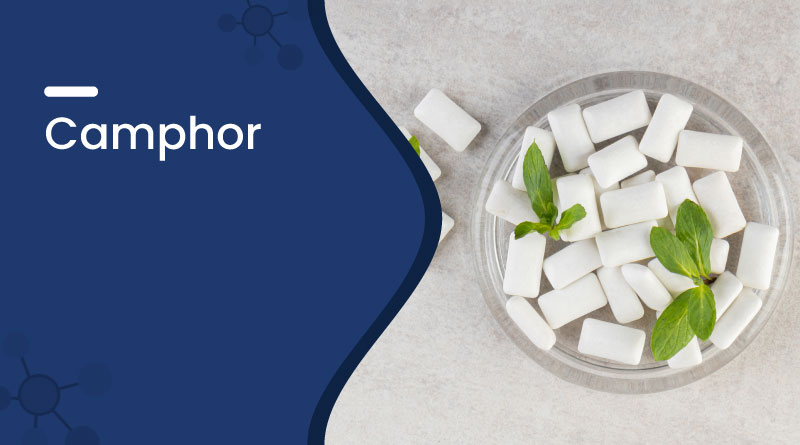Camphor – Uses, Benefits, Side Effects & Ayurvedic Importance


Camphor, called 'Karpura' in Ayurveda, is a white, crystal-like substance made from the wood of the Camphor tree. It has a sharp fragrance and cooling sensation and is highly valued in both medicinal and spiritual practices. Camphor has been traditionally used for skin issues, respiratory problems, joint pain, and mental clarity. Its strong anti-inflammatory, antiseptic, and analgesic properties make it a popular ingredient in balms, oils, and topical medicines.
In this blog, we will explore the Ayurvedic value of Camphor, its components, key health benefits, usage methods, safety measures, and frequently asked questions to help you understand its full healing potential.
Importance of Camphor in Ayurveda:
In Ayurveda, Camphor is known for its cooling, strong, and drying effects on the body. It helps balance Kapha and Vata doshas, making it ideal for treating respiratory congestion, muscle stiffness, and skin infections. Ancient Ayurvedic texts describe camphor as "Hrudya" (heart supportive), "Kantikara" (cleansing and brightening the throat), and "Krimihara" (anti-parasitic). It’s used in external applications like Abhyanga (oil massage), Dhoopana (fumigation), and Lepas (herbal pastes) to purify the mind, body, and surroundings.
Benefits of Camphor:
- Camphor for Cold and Cough: Camphor helps clear chest congestion, soothes throat irritation, and relieves coughing by opening up the nasal passages. It is a natural remedy that helps clear a blocked nose and is often used in vapor rubs.
- Camphor for Joint Pain: Camphor lowers swelling, improves blood flow, and relieves joint pain when rubbed on the sore area. It gives a cooling effect that soothes arthritis, sprains, and muscular discomfort.
- Camphor for Skin Itching: Camphor calms skin irritation, soothes rashes, and controls itchiness. Its anti-inflammatory nature makes it great for conditions like eczema, insect bites, and minor allergic reactions.
- Camphor for Acne and Pimples: Camphor cools the skin, kills germs, and helps reduce pimples and acne. Regular use clears skin, tightens pores, and gives a fresh, clean appearance.
- Camphor for Hair Fall: Camphor improves blood flow in the scalp, feeds the hair roots, and helps new hair grow. It helps reduce hair fall and strengthens hair from the roots naturally.
- Camphor for Dandruff: Camphor helps remove dandruff and scalp flakiness by killing fungi and cooling the scalp. It leaves the scalp healthy, itch-free, and clean after regular oil massage.
- Camphor for Headache: Camphor’s strong aroma and cooling properties relieve headaches caused by tension or sinus pressure. Just a gentle rub on the forehead helps ease the pain quickly.
- Camphor for Stress and Anxiety: Camphor’s calming fragrance helps reduce stress, nervousness, and anxiety. Inhaling camphor can relax the mind and promote better sleep and emotional balance naturally.
- Camphor for Fungal Infections: Camphor kills germs that cause skin infections like ringworm. Putting camphor oil on the area helps clean and heal the skin.
- Camphor for Burns and Wounds: Camphor helps heal small burns, cuts, and wounds because it cools the skin and fights germs. It soothes pain, reduces infection risk, and supports faster skin recovery.
- Camphor for Chest Congestion: Camphor, when inhaled through steam or balm, helps break down mucus and clear chest congestion. It improves breathing and gives relief during cold and flu.
- Camphor for Cracked Heels: Applying camphor softens cracked heels and removes dryness. It deeply moisturizes the skin and prevents further cracks, giving smooth and healthy-looking feet.
- Camphor for Insect Bites: Camphor relieves itching, swelling, and irritation from insect bites. Its cooling and antiseptic effect reduces the urge to scratch and promotes faster healing.
- Camphor for Muscle Cramps: Massaging camphor oil on stiff muscles helps reduce cramps and soreness. It increases blood flow and provides a soothing warm-cool relief to tired muscles.
- Camphor for a Toothache: Camphor oil has pain-relieving and antimicrobial properties that help ease a toothache. Applying diluted camphor near the aching tooth gives temporary relief from discomfort.
- Camphor for Scalp Infections: Camphor clears scalp infections by reducing inflammation and controlling fungal growth. It keeps the scalp clean, nourished, and free from itching or boils.
- Camphor for Insomnia: The relaxing aroma of camphor helps calm the brain and body. Keeping camphor nearby or inhaling its scent promotes deep sleep and fights insomnia naturally.
- Camphor for Dull Skin: Camphor improves blood circulation and skin tone. It clears impurities, shrinks pores, and adds a healthy glow when used in face masks or creams.
- Camphor for Respiratory Issues: Camphor helps open blocked airways and eases breathing in asthma, bronchitis, or sinusitis. It acts as a natural respiratory aid when inhaled as steam or balm.
How to Use Camphor?
Forms Available:
- Solid Camphor Tablets
- Camphor Oil
- Camphor Balm or Ointment
- Aromatic Camphor Candles or Diffusers
Common Usage Methods:
- Steam Inhalation: Inhale camphor steam to clear a blocked nose.
- Topical Use: Apply camphor oil mix to the body for massage.
- Aromatic Use: Diffuse camphor to relax the mind and purify the air.
- Camphor Balm: Rub balm on joints or forehead for pain relief.
When to Use Camphor?
- Suffering from a cold, congestion, or a cough
- Experiencing joint or muscle pain
- Struggling with skin infections, acne, or dandruff
- Needing mental relaxation or spiritual upliftment
- Dealing with minor burns, wounds, or bug bites
How Does Camphor Work?
Camphor works by touching nerves to reduce pain and itching. When inhaled, it acts on the respiratory system by loosening mucus and clearing blocked nasal passages. On the skin, it produces a cooling sensation that eases irritation and swelling. Internally, in minute amounts, it may support digestion and detoxification, though it should only be used this way under medical supervision.
Who Should Use Camphor?
- People with frequent respiratory or sinus issues
- Individuals with muscular or joint pain
- Those with fungal or skin infections
- Anyone seeking mental clarity or spiritual energy
- People looking for natural remedies for common ailments
Safety Measures:
- Topical Use Only: Always dilute camphor oil before skin application.
- Avoid Internal Use: Not to be ingested unless prescribed in a specific Ayurvedic dose.
- Pregnancy: Avoid use during pregnancy and lactation unless advised by a qualified practitioner.
- Children: Use with caution; do not apply near nostrils or mouth.
- Sensitive Skin: Patch test to avoid allergies.
Conclusion:
Camphor is a time-honored Ayurvedic healer with a wide range of applications for the mind, body, and spirit. Whether it's relieving cold symptoms, soothing aches, or purifying your surroundings, camphor serves as a multipurpose natural remedy. With proper usage and guidance, it can be a safe and effective addition to your home wellness toolkit.
Frequently Asked Questions (FAQs):
- Q: Can camphor be applied directly to the skin?
A: No, always dilute it with a carrier oil to avoid irritation. - Q: Is camphor safe for children?
A: Use minimal amounts and avoid applying near the nose or mouth. - Q: Can camphor be ingested?
A: Only in strictly regulated Ayurvedic formulations. Never ingest raw camphor. - Q: Does camphor help with anxiety?
A: Yes, its aroma has calming effects that can reduce anxiety and promote sleep. - Q: How often can camphor be used in a massage?
A: 2–3 times a week is generally safe, especially for pain relief.
Recent Blogs
Disclaimer : Zeelab Pharmacy provides health information for knowledge only. Do not self-medicate. Always consult a qualified doctor before starting, stopping, or changing any medicine or treatment.
















 Added!
Added!